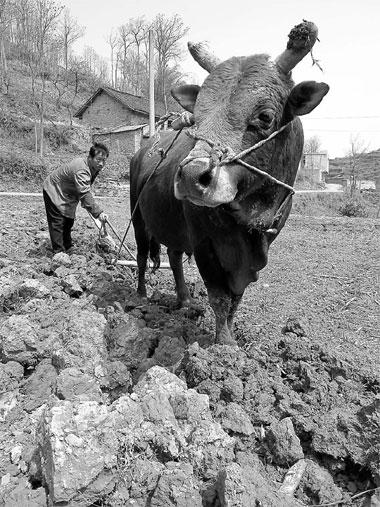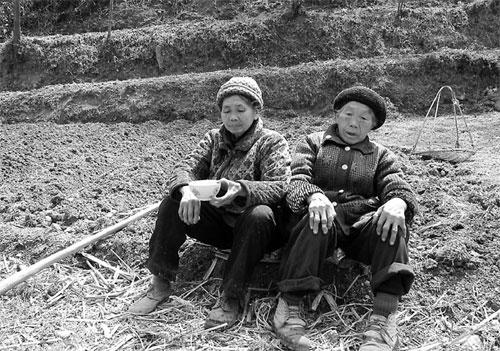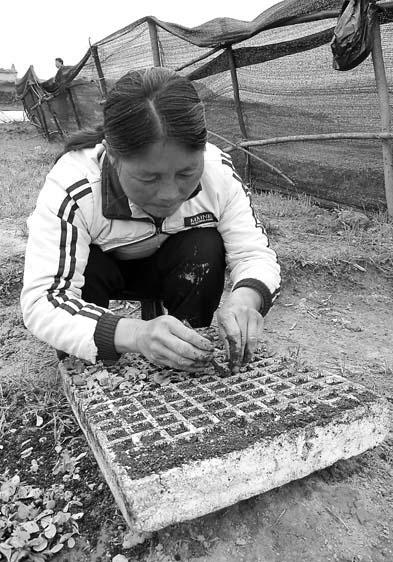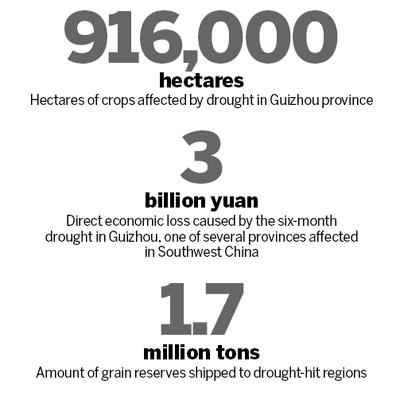Drought is sparking fears of inflation and food shortages in Southwest China, report Wang Huazhong in Guizhou, and Peng Yining and Li Yingqing in Yunnan.
 Lu Guangfu, a 41-year-old villager in Yizhai, Guizhou province, attempts to till his land after a recent shower. The ox refused to move after a few steps.[WANG HUAZHONG / CHINA DAILY PHOTOS]
Lu Guangfu, a 41-year-old villager in Yizhai, Guizhou province, attempts to till his land after a recent shower. The ox refused to move after a few steps.[WANG HUAZHONG / CHINA DAILY PHOTOS]Farmer Zhu Chaosong had just a week to plough two hectares of land and plant his annual potato crop on the Guizhou plateau this year. It normally takes him about two weeks but seven days' leave was all the bosses at the mine where he works would allow.
Zhu, 35, was forced to leave his family in Liangshan village to earn extra money in coal-rich Nayong county two months ago because of the devastating drought in Southwest China. "We did not have a good 2009," he said solemnly as he rode a bus home.
"After we sold some of our potato yield, there wasn't enough left for my family to eat. If I hadn't gone back to the pits, my wife and two children could have starved."
The ongoing drought, which has lasted since last autumn and been dubbed the worst in a century, has dried out all of the village's water tanks. Zhu's wife must walk three kilometers on snaking mountain paths to fetch turbid water three times a day for her family and cattle.
Although Zhu is returning to sow his crops, like 28 million other farmers in the thirsty region, he knows he could ultimately be making a wasted journey if rain does not arrive soon.
"There's no water left. Only the rain can keep my potatoes alive and help them to grow," he said. "I can only hope for the best."
By the end of March, Guizhou had seen more than 916,000 hectares of crops affected by drought, causing a direct loss of almost 3 billion yuan ($440 million), according to figures released by the provincial agricultural commission.
The commission's publicity director, Zheng Chuanlou, also told China Daily that crops to be harvested this summer, such as rape and wheat, are "doomed", with most areas likely to see dramatically reduced or even zero output.
Already about eight million people just in Yunnan province are suffering a grain shortage, said Wang Shufen, director of the Yunnan provincial civil administration, who told China News Service that five million had "no financial income and are relying on government handouts".
The situation has prompted fears among analysts that low output of cash crops - rapeseed, medicinal materials, tobacco, sugar, tea and flowers - will push up prices nationwide.
To stabilize prices and curb the potential inflation, the central government ordered the transfer of 1.7 million tons of grain reserves to the drought-hit region, Shen Leihai, a senior State official responsible for China's food security, told Southern Weekend, a newspaper based in Guangzhou.
Authorities have also threatened heavy penalties for companies who attempt to profit from a natural disaster by raising wholesale prices.
 Two elderly women in Dexing township, Guizhou, take a rest working on their dried fields.[WANG HUAZHONG / CHINA DAILY PHOTOS]
Two elderly women in Dexing township, Guizhou, take a rest working on their dried fields.[WANG HUAZHONG / CHINA DAILY PHOTOS] Running on empty
 Ye Qinghong, 42, a farmer in Guizhou, tries to replant her tobacco seedlings. She said that if they do not grow she will have to consider fi nding a job in a factory in East China. [China Daily]
Ye Qinghong, 42, a farmer in Guizhou, tries to replant her tobacco seedlings. She said that if they do not grow she will have to consider fi nding a job in a factory in East China. [China Daily]China previously had six years of good harvests before the drought and, as the southwest accounts for only 2 percent of the annual grain production, feeding the region should not be a major problem.
However, the biggest challenge - the lack of rainfall - is far from solved, said publicity official Zheng.
Between July 2009 and last month, most areas of Guizhou have seen a 20 to 50 percent drop in rainfall, according to figures from the provincial water resources bureau. About 3,600 rivers and brooks have run dry, while water reserves in ponds and reservoirs have fallen by 368 million cubic meters over the last 12 months to below 779 million cu m.
Most farmers in the province grow water-guzzling crops like rice, tobacco and vegetables (potatoes and corn need less water but they also generate less revenue), but as the peak planting time is usually around Tomb-sweeping Day, which this year fell last Monday, the lack of water meant farmers were forced to delay spring cultivation. The hold up will "prevent seedlings from developing normally", said Zheng, while farmers complained the ground is too hard to plow.
Lu Guangfu, a 41-year-old villager in Yizhai, said his attempts to till his land after a recent shower failed as the oxen refused to pull after a few steps. "The land is as hard as stones," he said as he slammed his hoe into the soil.
However, time is running out. Although meteorology authorities predict the drought will last until the end of May, in just four weeks China will enter a long, hot summer, by which time it will be too late to plant. Farmers say getting seedlings ready to be replanted in the fields takes 40 days.
Even if the seedlings are successfully planted, the drought is also sparking conflicts over how much of the region's limited water resources should be used to irrigate them.
Almost 6 million people and 2.5 million cattle do not have enough available drinking water, despite government efforts to find new sources and ship supplies to remote areas, said the Guizhou water resources bureau.
Authorities in Yunwu town in the south of the province are closely regulating water from Wudaohe River so that it is "only used for drinking, and not watering paddies or seedlings", said resident Lin Xiaolong, 55. He explained the move followed a media report that the river's water reserves had already fallen from 2.7 million cu m to just 300,000 cu m.
"I can understand the difficult situation and I support the government's decision, but now is the time to raise seedlings," he said. "Only about one-fifth of farmers have bothered to buy rice seeds. Others felt that, without enough water, the seedlings would go to waste if no rain comes."
Provincial water resources and agriculture authorities both endorsed the principle that "drinking water comes first, then production".
"Our priority, like in other regions, is to guarantee drinking water supplies for the public. People's lives comes first," said Wang Kaizhi, director of the drought relief office in the city of Duyun. "Our functioning water resource projects can only relieve the impact of the drought on spring cultivation to some extent."
Going up in smoke

Farmers in some regions have already begun to raise seedlings but many are drying out before the rain comes. Among the worst affected is tobacco crops, one of the pillar industries in Yunnan.
The province produces one-third of China's tobacco across about 360,000 hectares, according to the provincial tobacco monopoly bureau, and involves almost two million households. Qian Guancun makes 20,000 yuan a year - almost half of her family's entire income - from his 9 mu (0.6 hectares) of flue-cured tobacco fields in Shilin county. Every spring, she also usually harvests about 300 kg of wheat.
The drought has already destroyed her entire wheat crop and, if the dry spell continues, she fears her tobacco could also be wiped out.
Each week, Qian and her 9-year-old son drive an oxcart 1 km to collect 200 liters of water from the nearest well, "but we can only use this for drinking water", she said. "If there is no rain by May, my tobacco seedlings will be dead."
April 20 to May 10 is the best time to plant tobacco, explained Li Long, director of a tobacco seedlings farm in Shilin. "If farmers miss this time, their yield is seriously reduced also each seedling needs at least 3 liters of water to survive the transplanting process."
Li, whose business provides seedlings to 3,000 farmers, uses greenhouses and irrigation systems to stop seedlings from drying out, and is also building a water link with a nearby reservoir. "But even the reservoir has dried out," he said.
"After we have solved the drinking water problem, we will focus on the protection of the tobacco industry," said Zhang Xuegang, a high-ranking county publicity official.
Even if the rain does come, experts warn there may not be enough villagers left to till the fields, with many young laborers now in cities trying to make up for their drought losses.
More than one million farmers have already left to seek jobs in other provinces, said Xu Haitao, director of the employment bureau under the Guizhou labor and social security department.
China Daily discovered that in several towns in Guizhou, there are very few young laborers left. In one village, a reporter found a 78-year-old man plowing his land.
"I would be better off finding opportunities outside rather than waiting here for rain," said Lu Guangfu in Yizhai. "Almost all the young men have gone. Even when the rain comes, one-fifth of the land in our village will be abandoned."
To cope with the water crisis, Guizhou's agricultural commission has drawn guidelines for the spring cultivation.
Among the suggestions is farmers switching to crops that consume less water, such as corn, potatoes, grains and beans. For those unfamiliar with different crop categories, the commission has sent agricultural experts to the countryside to teach them about the necessary technologies.
"We are encouraging farmers, especially those living by rivers, to cooperatively raise seedlings, while the government is also considering offering subsidies for seedlings that go unused," said commission publicity director Zheng.
However, some are unwilling to play the waiting game.
"My brother-in-law and I cannot go back to growing corn for less profit," said 42-year-old tobacco farmer Ye Qinghong. "If our seedlings do not develop, we will probably join my husband at a factory in Zhejiang province."
---------------------------------------------------------------------------------------------
WEATHER EXPERTS ADMIT DROUGHT MISTAKE
BEIJING - China's meteorological authority this week admitted its failure in forecasting the devastating drought aff ecting more than 61 million people in Southwest China, according to media reports.
We failed to make a precise forecast on the drought that has lasted so long due to our limited scientifi c and technological levels," Ren Fumin, an offi cial with the National Climate Center, told People's Daily.
Predicting the climate is much more diffi cult than forecasting short-term weather conditions, he said, because the former requires more indicators from the atmosphere or even outer space, such as solar activity.
"Our knowledge about the indicators from the outer atmosphere and their relations with climate change is limited," he said.
In April 1998, Chinese meteorologists accurately predicted the Yangtze River would burst its banks that summer. Such success stories, however, are rare.
"Forecasting the climate remains a major challenge for meteorological departments, although we have been working hard on this over the years," said Yu Xinwen, spokesman for the China Meteorological Administration.
Due to the low accuracy of predications, they are often only provided to government officials, rather than released to the public, he said.
The ongoing drought, the worst in a century, has lingered in Yunnan, Sichuan and Guizhou provinces, Chongqing municipality and the Guangxi Zhuang autonomous region since last September.
The natural disaster has left almost 20 million people, as well as millions of livestock, short of drinking water.
CHINA DAILY
More Cover Stories





